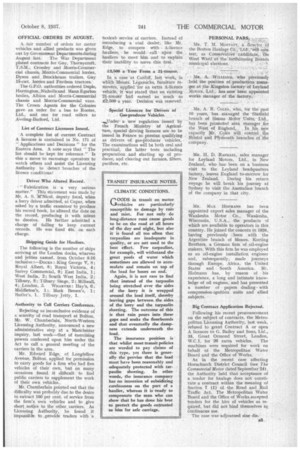TRANSIT INSURANCE NOTES.
Page 39

If you've noticed an error in this article please click here to report it so we can fix it.
CLIMATIC CONDITIONS.
GOODS in transit on motor vehicles are particularly susceptible to damage by rain and mist. For not only do long-distance runs cause goods to be on the road at all hours of the day and night, but also it is found all too often that tarpaulins are inadequate in quality, or are not used to the best effect. Few tarpaulins, for example, will withstand the great pools of water which sometimes are allowed to accumulate and remain on top of the load for hours on end.
Again, it is not rare to find that instead of the tarpaulin being stretched over the sides of the lorry it is wrapped around the load itself, thereby leaving gaps between the sides of the lorry and the tarpaulin sheeting. The outcome of this is that rain pours into these gaps and soaks the floorboards and that eventually the dampness extends underneath the load.
The insurance position is that whilst most transit policies are worded to pay claims of this type, yet there is gener. ally the proviso that the load must have been reasonably and adequately protected with tarpaulin sheeting. In other words, the insurance company has no intention of subsidizing carelessness on the part of a haulier, whereas it is ready to compensate the man who can show that he has done his best to protect the goods entrusted to him for safe carriage.




























































































